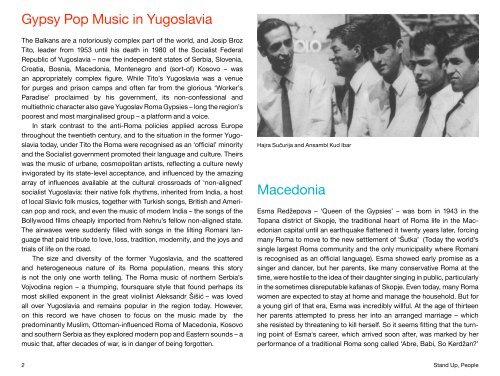gypsy pop songs from tito's yugoslavia 1964 â 1980 - Asphalt Tango
gypsy pop songs from tito's yugoslavia 1964 â 1980 - Asphalt Tango
gypsy pop songs from tito's yugoslavia 1964 â 1980 - Asphalt Tango
You also want an ePaper? Increase the reach of your titles
YUMPU automatically turns print PDFs into web optimized ePapers that Google loves.
Gypsy Pop Music in Yugoslavia<br />
The Balkans are a notoriously complex part of the world, and Josip Broz<br />
Tito, leader <strong>from</strong> 1953 until his death in <strong>1980</strong> of the Socialist Federal<br />
Republic of Yugoslavia – now the independent states of Serbia, Slovenia,<br />
Croatia, Bosnia, Macedonia, Montenegro and (sort-of) Kosovo – was<br />
an appropriately complex figure. While Tito’s Yugoslavia was a venue<br />
for purges and prison camps and often far <strong>from</strong> the glorious ‘Worker’s<br />
Paradise’ proclaimed by his government, its non-confessional and<br />
multiethnic character also gave Yugoslav Roma Gypsies – long the region’s<br />
poorest and most marginalised group – a platform and a voice.<br />
In stark contrast to the anti-Roma policies applied across Europe<br />
throughout the twentieth century, and to the situation in the former Yugoslavia<br />
today, under Tito the Roma were recognised as an ‘official’ minority<br />
and the Socialist government promoted their language and culture. Theirs<br />
was the music of urbane, cosmopolitan artists, reflecting a culture newly<br />
invigorated by its state-level acceptance, and influenced by the amazing<br />
array of influences available at the cultural crossroads of ‘non-aligned’<br />
socialist Yugoslavia: their native folk rhythms, inherited <strong>from</strong> India, a host<br />
of local Slavic folk musics, together with Turkish <strong>songs</strong>, British and American<br />
<strong>pop</strong> and rock, and even the music of modern India – the <strong>songs</strong> of the<br />
Bollywood films cheaply imported <strong>from</strong> Nehru’s fellow non-aligned state.<br />
The airwaves were suddenly filled with <strong>songs</strong> in the lilting Romani language<br />
that paid tribute to love, loss, tradition, modernity, and the joys and<br />
trials of life on the road.<br />
The size and diversity of the former Yugoslavia, and the scattered<br />
and heterogeneous nature of its Roma <strong>pop</strong>ulation, means this story<br />
is not the only one worth telling. The Roma music of northern Serbia’s<br />
Vojvodina region – a thumping, foursquare style that found perhaps its<br />
most skilled exponent in the great violinist Aleksandr Šišić – was loved<br />
all over Yugoslavia and remains <strong>pop</strong>ular in the region today. However,<br />
on this record we have chosen to focus on the music made by the<br />
predominantly Muslim, Ottoman-influenced Roma of Macedonia, Kosovo<br />
and southern Serbia as they explored modern <strong>pop</strong> and Eastern sounds – a<br />
music that, after decades of war, is in danger of being forgotten.<br />
Hajra Sučurija and Ansambl Kud Ibar<br />
Macedonia<br />
Esma Redžepova – ‘Queen of the Gypsies’ – was born in 1943 in the<br />
Topana district of Skopje, the traditional heart of Roma life in the Macedonian<br />
capital until an earthquake flattened it twenty years later, forcing<br />
many Roma to move to the new settlement of ‘Šutka’ (Today the world’s<br />
single largest Roma community and the only municipality where Romani<br />
is recognised as an official language). Esma showed early promise as a<br />
singer and dancer, but her parents, like many conservative Roma at the<br />
time, were hostile to the idea of their daughter singing in public, particularly<br />
in the sometimes disreputable kafanas of Skopje. Even today, many Roma<br />
women are expected to stay at home and manage the household. But for<br />
a young girl of that era, Esma was incredibly willful. At the age of thirteen<br />
her parents attempted to press her into an arranged marriage – which<br />
she resisted by threatening to kill herself. So it seems fitting that the turning<br />
point of Esma's career, which arrived soon after, was marked by her<br />
performance of a traditional Roma song called ‘Abre, Babi, So Kerdžan?’<br />
2 Stand Up, People



